Sociology Essay: Colonization's Impact on Aboriginal Australians
VerifiedAdded on 2022/12/27
|8
|2257
|3
Essay
AI Summary
This sociology essay delves into the enduring impacts of colonization on Aboriginal and Torres Strait Islander communities in Australia. It explores the historical context, including the policies and societal beliefs that led to oppression and displacement, and analyzes how these factors have fostered distrust of social workers and other human services professionals in contemporary practice settings. The essay examines the historical mistreatment, land dispossession, and cultural disruption experienced by Indigenous Australians, highlighting the lasting trauma and its influence on their interactions with social workers. Furthermore, it discusses the importance of culturally safe practices, the need for increased representation of Indigenous people in social work, and the critical role of understanding the history of colonization in fostering trust and improving outcomes for Aboriginal and Torres Strait Islander communities. The essay concludes by emphasizing the importance of social justice and equality in addressing the socioeconomic disadvantages faced by these communities and promoting their overall well-being.
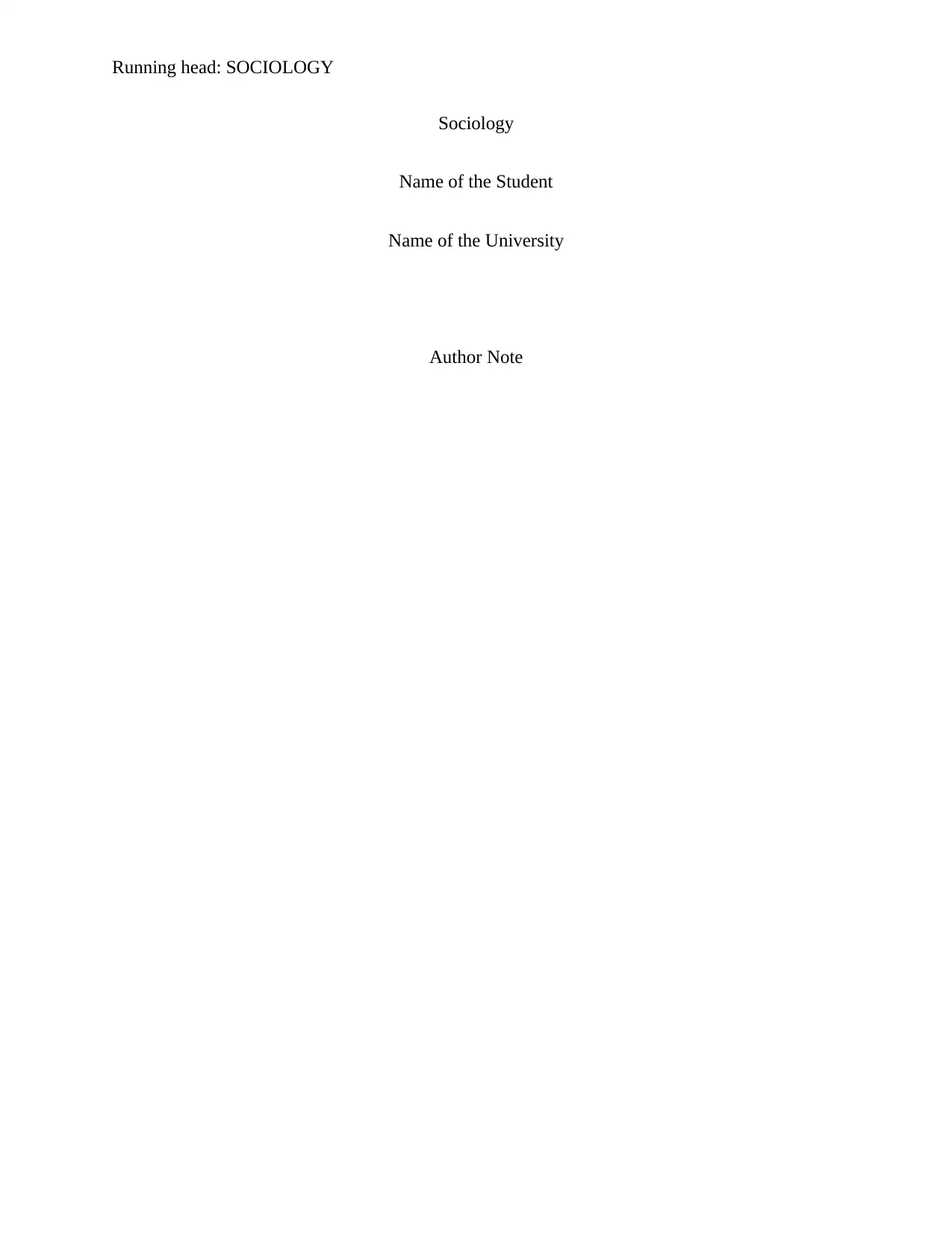
Running head: SOCIOLOGY
Sociology
Name of the Student
Name of the University
Author Note
Sociology
Name of the Student
Name of the University
Author Note
Paraphrase This Document
Need a fresh take? Get an instant paraphrase of this document with our AI Paraphraser
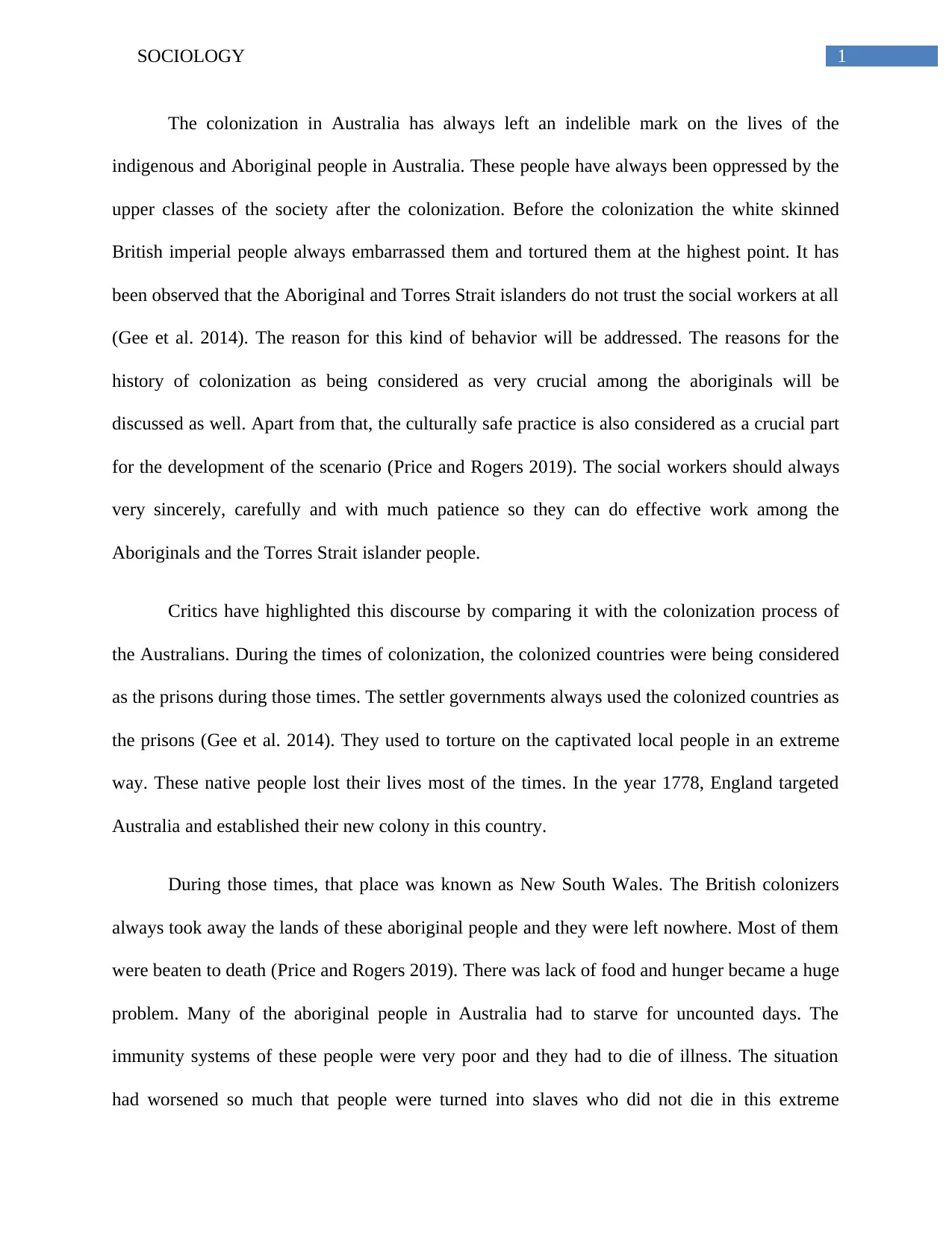
1SOCIOLOGY
The colonization in Australia has always left an indelible mark on the lives of the
indigenous and Aboriginal people in Australia. These people have always been oppressed by the
upper classes of the society after the colonization. Before the colonization the white skinned
British imperial people always embarrassed them and tortured them at the highest point. It has
been observed that the Aboriginal and Torres Strait islanders do not trust the social workers at all
(Gee et al. 2014). The reason for this kind of behavior will be addressed. The reasons for the
history of colonization as being considered as very crucial among the aboriginals will be
discussed as well. Apart from that, the culturally safe practice is also considered as a crucial part
for the development of the scenario (Price and Rogers 2019). The social workers should always
very sincerely, carefully and with much patience so they can do effective work among the
Aboriginals and the Torres Strait islander people.
Critics have highlighted this discourse by comparing it with the colonization process of
the Australians. During the times of colonization, the colonized countries were being considered
as the prisons during those times. The settler governments always used the colonized countries as
the prisons (Gee et al. 2014). They used to torture on the captivated local people in an extreme
way. These native people lost their lives most of the times. In the year 1778, England targeted
Australia and established their new colony in this country.
During those times, that place was known as New South Wales. The British colonizers
always took away the lands of these aboriginal people and they were left nowhere. Most of them
were beaten to death (Price and Rogers 2019). There was lack of food and hunger became a huge
problem. Many of the aboriginal people in Australia had to starve for uncounted days. The
immunity systems of these people were very poor and they had to die of illness. The situation
had worsened so much that people were turned into slaves who did not die in this extreme
The colonization in Australia has always left an indelible mark on the lives of the
indigenous and Aboriginal people in Australia. These people have always been oppressed by the
upper classes of the society after the colonization. Before the colonization the white skinned
British imperial people always embarrassed them and tortured them at the highest point. It has
been observed that the Aboriginal and Torres Strait islanders do not trust the social workers at all
(Gee et al. 2014). The reason for this kind of behavior will be addressed. The reasons for the
history of colonization as being considered as very crucial among the aboriginals will be
discussed as well. Apart from that, the culturally safe practice is also considered as a crucial part
for the development of the scenario (Price and Rogers 2019). The social workers should always
very sincerely, carefully and with much patience so they can do effective work among the
Aboriginals and the Torres Strait islander people.
Critics have highlighted this discourse by comparing it with the colonization process of
the Australians. During the times of colonization, the colonized countries were being considered
as the prisons during those times. The settler governments always used the colonized countries as
the prisons (Gee et al. 2014). They used to torture on the captivated local people in an extreme
way. These native people lost their lives most of the times. In the year 1778, England targeted
Australia and established their new colony in this country.
During those times, that place was known as New South Wales. The British colonizers
always took away the lands of these aboriginal people and they were left nowhere. Most of them
were beaten to death (Price and Rogers 2019). There was lack of food and hunger became a huge
problem. Many of the aboriginal people in Australia had to starve for uncounted days. The
immunity systems of these people were very poor and they had to die of illness. The situation
had worsened so much that people were turned into slaves who did not die in this extreme
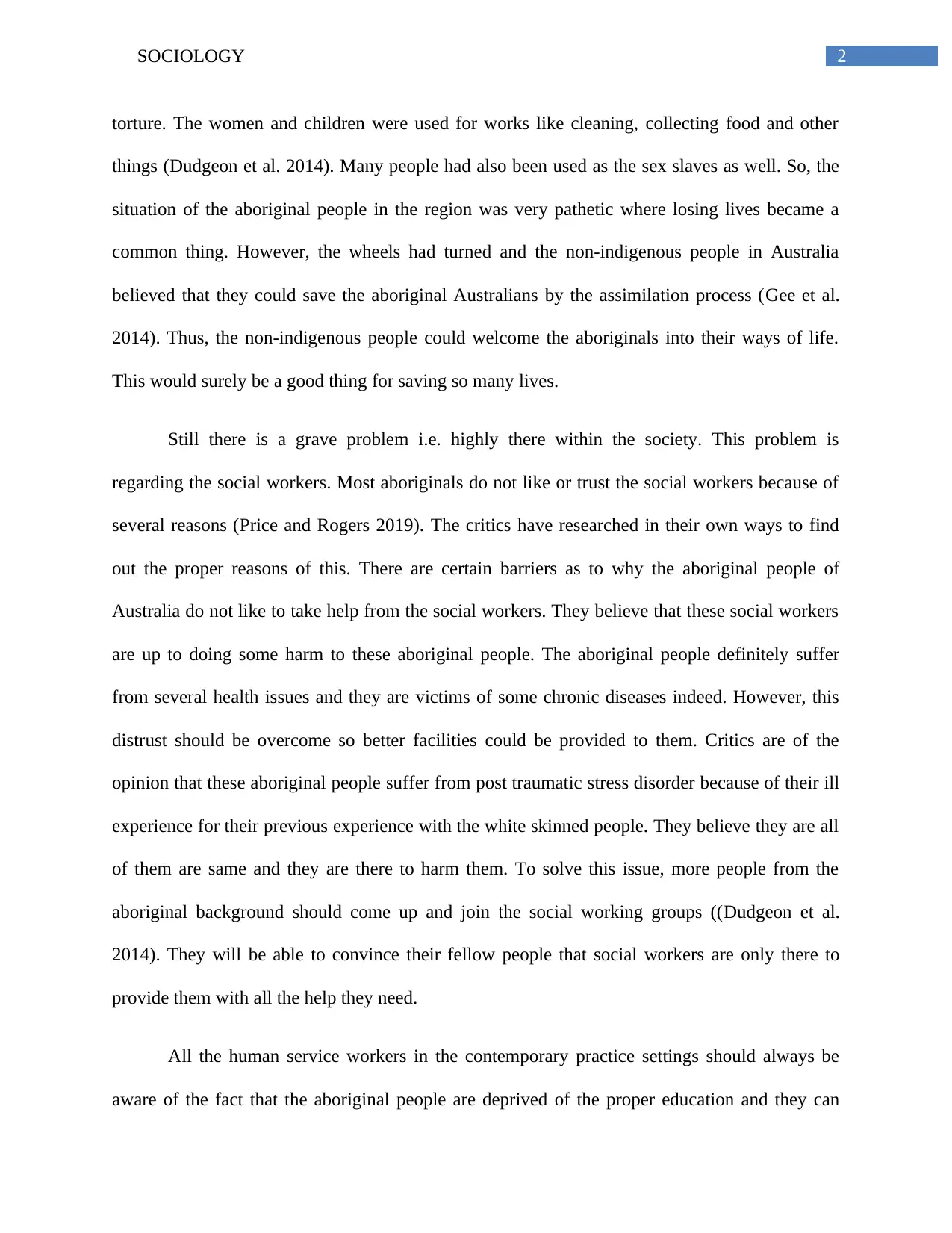
2SOCIOLOGY
torture. The women and children were used for works like cleaning, collecting food and other
things (Dudgeon et al. 2014). Many people had also been used as the sex slaves as well. So, the
situation of the aboriginal people in the region was very pathetic where losing lives became a
common thing. However, the wheels had turned and the non-indigenous people in Australia
believed that they could save the aboriginal Australians by the assimilation process (Gee et al.
2014). Thus, the non-indigenous people could welcome the aboriginals into their ways of life.
This would surely be a good thing for saving so many lives.
Still there is a grave problem i.e. highly there within the society. This problem is
regarding the social workers. Most aboriginals do not like or trust the social workers because of
several reasons (Price and Rogers 2019). The critics have researched in their own ways to find
out the proper reasons of this. There are certain barriers as to why the aboriginal people of
Australia do not like to take help from the social workers. They believe that these social workers
are up to doing some harm to these aboriginal people. The aboriginal people definitely suffer
from several health issues and they are victims of some chronic diseases indeed. However, this
distrust should be overcome so better facilities could be provided to them. Critics are of the
opinion that these aboriginal people suffer from post traumatic stress disorder because of their ill
experience for their previous experience with the white skinned people. They believe they are all
of them are same and they are there to harm them. To solve this issue, more people from the
aboriginal background should come up and join the social working groups ((Dudgeon et al.
2014). They will be able to convince their fellow people that social workers are only there to
provide them with all the help they need.
All the human service workers in the contemporary practice settings should always be
aware of the fact that the aboriginal people are deprived of the proper education and they can
torture. The women and children were used for works like cleaning, collecting food and other
things (Dudgeon et al. 2014). Many people had also been used as the sex slaves as well. So, the
situation of the aboriginal people in the region was very pathetic where losing lives became a
common thing. However, the wheels had turned and the non-indigenous people in Australia
believed that they could save the aboriginal Australians by the assimilation process (Gee et al.
2014). Thus, the non-indigenous people could welcome the aboriginals into their ways of life.
This would surely be a good thing for saving so many lives.
Still there is a grave problem i.e. highly there within the society. This problem is
regarding the social workers. Most aboriginals do not like or trust the social workers because of
several reasons (Price and Rogers 2019). The critics have researched in their own ways to find
out the proper reasons of this. There are certain barriers as to why the aboriginal people of
Australia do not like to take help from the social workers. They believe that these social workers
are up to doing some harm to these aboriginal people. The aboriginal people definitely suffer
from several health issues and they are victims of some chronic diseases indeed. However, this
distrust should be overcome so better facilities could be provided to them. Critics are of the
opinion that these aboriginal people suffer from post traumatic stress disorder because of their ill
experience for their previous experience with the white skinned people. They believe they are all
of them are same and they are there to harm them. To solve this issue, more people from the
aboriginal background should come up and join the social working groups ((Dudgeon et al.
2014). They will be able to convince their fellow people that social workers are only there to
provide them with all the help they need.
All the human service workers in the contemporary practice settings should always be
aware of the fact that the aboriginal people are deprived of the proper education and they can
⊘ This is a preview!⊘
Do you want full access?
Subscribe today to unlock all pages.

Trusted by 1+ million students worldwide
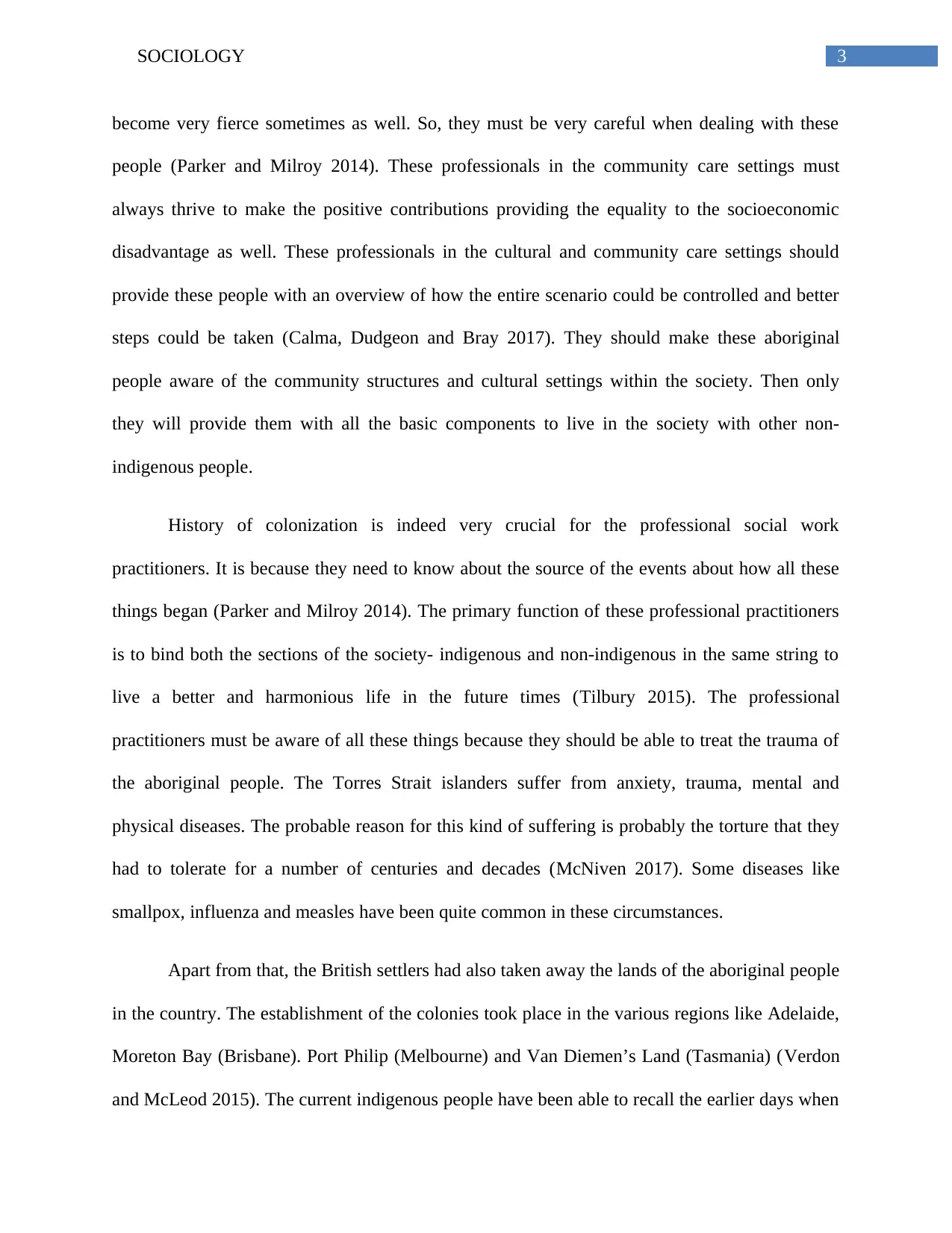
3SOCIOLOGY
become very fierce sometimes as well. So, they must be very careful when dealing with these
people (Parker and Milroy 2014). These professionals in the community care settings must
always thrive to make the positive contributions providing the equality to the socioeconomic
disadvantage as well. These professionals in the cultural and community care settings should
provide these people with an overview of how the entire scenario could be controlled and better
steps could be taken (Calma, Dudgeon and Bray 2017). They should make these aboriginal
people aware of the community structures and cultural settings within the society. Then only
they will provide them with all the basic components to live in the society with other non-
indigenous people.
History of colonization is indeed very crucial for the professional social work
practitioners. It is because they need to know about the source of the events about how all these
things began (Parker and Milroy 2014). The primary function of these professional practitioners
is to bind both the sections of the society- indigenous and non-indigenous in the same string to
live a better and harmonious life in the future times (Tilbury 2015). The professional
practitioners must be aware of all these things because they should be able to treat the trauma of
the aboriginal people. The Torres Strait islanders suffer from anxiety, trauma, mental and
physical diseases. The probable reason for this kind of suffering is probably the torture that they
had to tolerate for a number of centuries and decades (McNiven 2017). Some diseases like
smallpox, influenza and measles have been quite common in these circumstances.
Apart from that, the British settlers had also taken away the lands of the aboriginal people
in the country. The establishment of the colonies took place in the various regions like Adelaide,
Moreton Bay (Brisbane). Port Philip (Melbourne) and Van Diemen’s Land (Tasmania) (Verdon
and McLeod 2015). The current indigenous people have been able to recall the earlier days when
become very fierce sometimes as well. So, they must be very careful when dealing with these
people (Parker and Milroy 2014). These professionals in the community care settings must
always thrive to make the positive contributions providing the equality to the socioeconomic
disadvantage as well. These professionals in the cultural and community care settings should
provide these people with an overview of how the entire scenario could be controlled and better
steps could be taken (Calma, Dudgeon and Bray 2017). They should make these aboriginal
people aware of the community structures and cultural settings within the society. Then only
they will provide them with all the basic components to live in the society with other non-
indigenous people.
History of colonization is indeed very crucial for the professional social work
practitioners. It is because they need to know about the source of the events about how all these
things began (Parker and Milroy 2014). The primary function of these professional practitioners
is to bind both the sections of the society- indigenous and non-indigenous in the same string to
live a better and harmonious life in the future times (Tilbury 2015). The professional
practitioners must be aware of all these things because they should be able to treat the trauma of
the aboriginal people. The Torres Strait islanders suffer from anxiety, trauma, mental and
physical diseases. The probable reason for this kind of suffering is probably the torture that they
had to tolerate for a number of centuries and decades (McNiven 2017). Some diseases like
smallpox, influenza and measles have been quite common in these circumstances.
Apart from that, the British settlers had also taken away the lands of the aboriginal people
in the country. The establishment of the colonies took place in the various regions like Adelaide,
Moreton Bay (Brisbane). Port Philip (Melbourne) and Van Diemen’s Land (Tasmania) (Verdon
and McLeod 2015). The current indigenous people have been able to recall the earlier days when
Paraphrase This Document
Need a fresh take? Get an instant paraphrase of this document with our AI Paraphraser
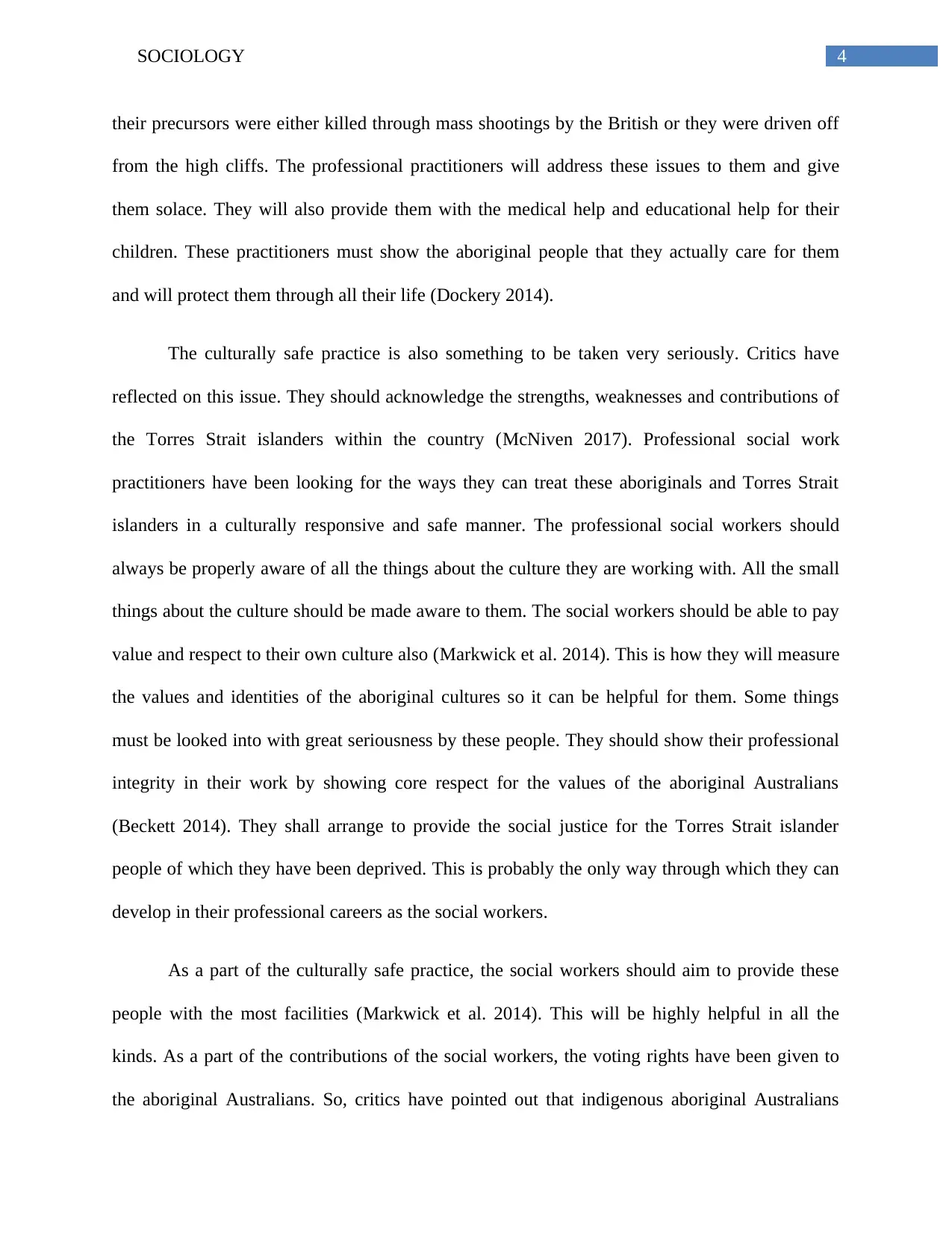
4SOCIOLOGY
their precursors were either killed through mass shootings by the British or they were driven off
from the high cliffs. The professional practitioners will address these issues to them and give
them solace. They will also provide them with the medical help and educational help for their
children. These practitioners must show the aboriginal people that they actually care for them
and will protect them through all their life (Dockery 2014).
The culturally safe practice is also something to be taken very seriously. Critics have
reflected on this issue. They should acknowledge the strengths, weaknesses and contributions of
the Torres Strait islanders within the country (McNiven 2017). Professional social work
practitioners have been looking for the ways they can treat these aboriginals and Torres Strait
islanders in a culturally responsive and safe manner. The professional social workers should
always be properly aware of all the things about the culture they are working with. All the small
things about the culture should be made aware to them. The social workers should be able to pay
value and respect to their own culture also (Markwick et al. 2014). This is how they will measure
the values and identities of the aboriginal cultures so it can be helpful for them. Some things
must be looked into with great seriousness by these people. They should show their professional
integrity in their work by showing core respect for the values of the aboriginal Australians
(Beckett 2014). They shall arrange to provide the social justice for the Torres Strait islander
people of which they have been deprived. This is probably the only way through which they can
develop in their professional careers as the social workers.
As a part of the culturally safe practice, the social workers should aim to provide these
people with the most facilities (Markwick et al. 2014). This will be highly helpful in all the
kinds. As a part of the contributions of the social workers, the voting rights have been given to
the aboriginal Australians. So, critics have pointed out that indigenous aboriginal Australians
their precursors were either killed through mass shootings by the British or they were driven off
from the high cliffs. The professional practitioners will address these issues to them and give
them solace. They will also provide them with the medical help and educational help for their
children. These practitioners must show the aboriginal people that they actually care for them
and will protect them through all their life (Dockery 2014).
The culturally safe practice is also something to be taken very seriously. Critics have
reflected on this issue. They should acknowledge the strengths, weaknesses and contributions of
the Torres Strait islanders within the country (McNiven 2017). Professional social work
practitioners have been looking for the ways they can treat these aboriginals and Torres Strait
islanders in a culturally responsive and safe manner. The professional social workers should
always be properly aware of all the things about the culture they are working with. All the small
things about the culture should be made aware to them. The social workers should be able to pay
value and respect to their own culture also (Markwick et al. 2014). This is how they will measure
the values and identities of the aboriginal cultures so it can be helpful for them. Some things
must be looked into with great seriousness by these people. They should show their professional
integrity in their work by showing core respect for the values of the aboriginal Australians
(Beckett 2014). They shall arrange to provide the social justice for the Torres Strait islander
people of which they have been deprived. This is probably the only way through which they can
develop in their professional careers as the social workers.
As a part of the culturally safe practice, the social workers should aim to provide these
people with the most facilities (Markwick et al. 2014). This will be highly helpful in all the
kinds. As a part of the contributions of the social workers, the voting rights have been given to
the aboriginal Australians. So, critics have pointed out that indigenous aboriginal Australians
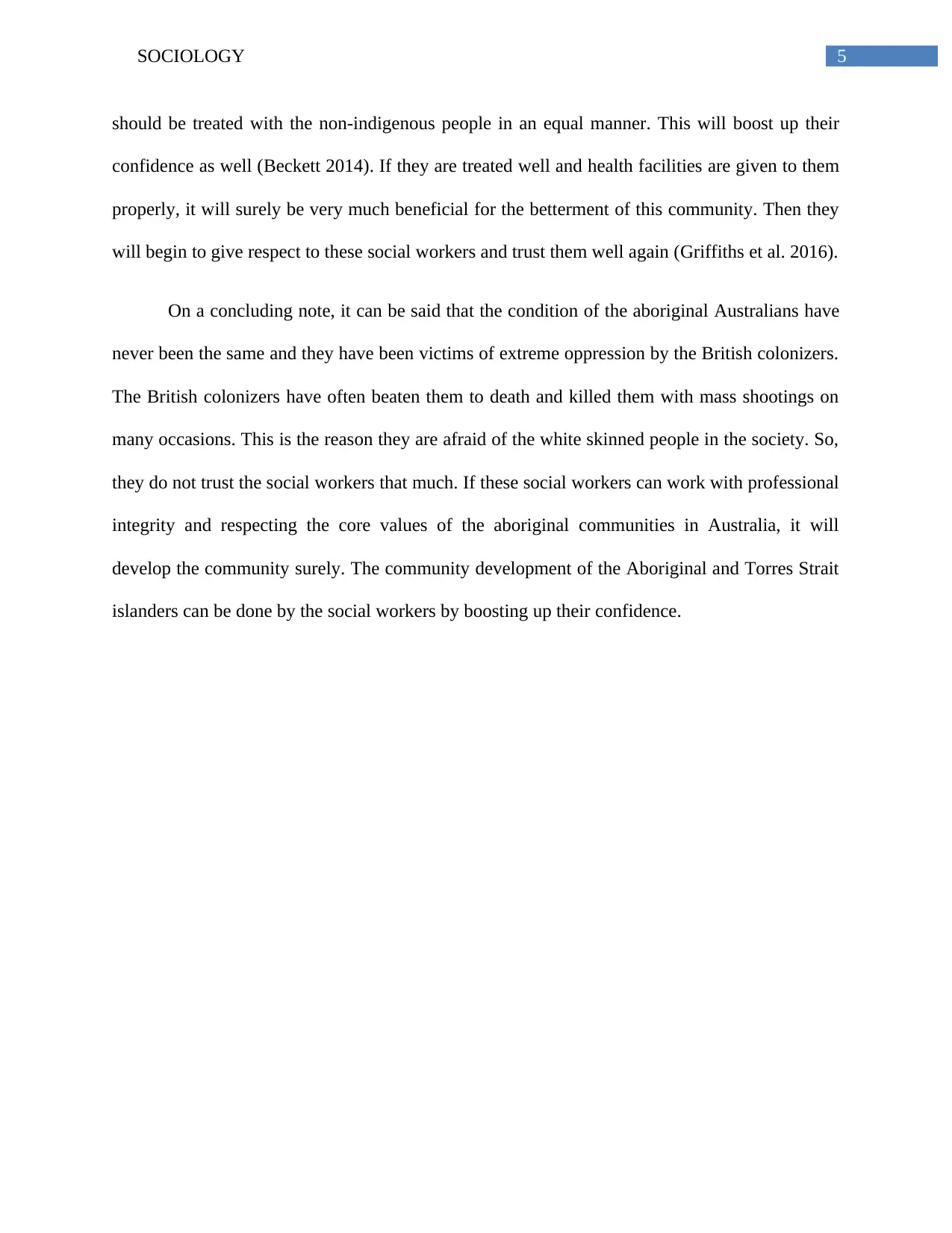
5SOCIOLOGY
should be treated with the non-indigenous people in an equal manner. This will boost up their
confidence as well (Beckett 2014). If they are treated well and health facilities are given to them
properly, it will surely be very much beneficial for the betterment of this community. Then they
will begin to give respect to these social workers and trust them well again (Griffiths et al. 2016).
On a concluding note, it can be said that the condition of the aboriginal Australians have
never been the same and they have been victims of extreme oppression by the British colonizers.
The British colonizers have often beaten them to death and killed them with mass shootings on
many occasions. This is the reason they are afraid of the white skinned people in the society. So,
they do not trust the social workers that much. If these social workers can work with professional
integrity and respecting the core values of the aboriginal communities in Australia, it will
develop the community surely. The community development of the Aboriginal and Torres Strait
islanders can be done by the social workers by boosting up their confidence.
should be treated with the non-indigenous people in an equal manner. This will boost up their
confidence as well (Beckett 2014). If they are treated well and health facilities are given to them
properly, it will surely be very much beneficial for the betterment of this community. Then they
will begin to give respect to these social workers and trust them well again (Griffiths et al. 2016).
On a concluding note, it can be said that the condition of the aboriginal Australians have
never been the same and they have been victims of extreme oppression by the British colonizers.
The British colonizers have often beaten them to death and killed them with mass shootings on
many occasions. This is the reason they are afraid of the white skinned people in the society. So,
they do not trust the social workers that much. If these social workers can work with professional
integrity and respecting the core values of the aboriginal communities in Australia, it will
develop the community surely. The community development of the Aboriginal and Torres Strait
islanders can be done by the social workers by boosting up their confidence.
⊘ This is a preview!⊘
Do you want full access?
Subscribe today to unlock all pages.

Trusted by 1+ million students worldwide
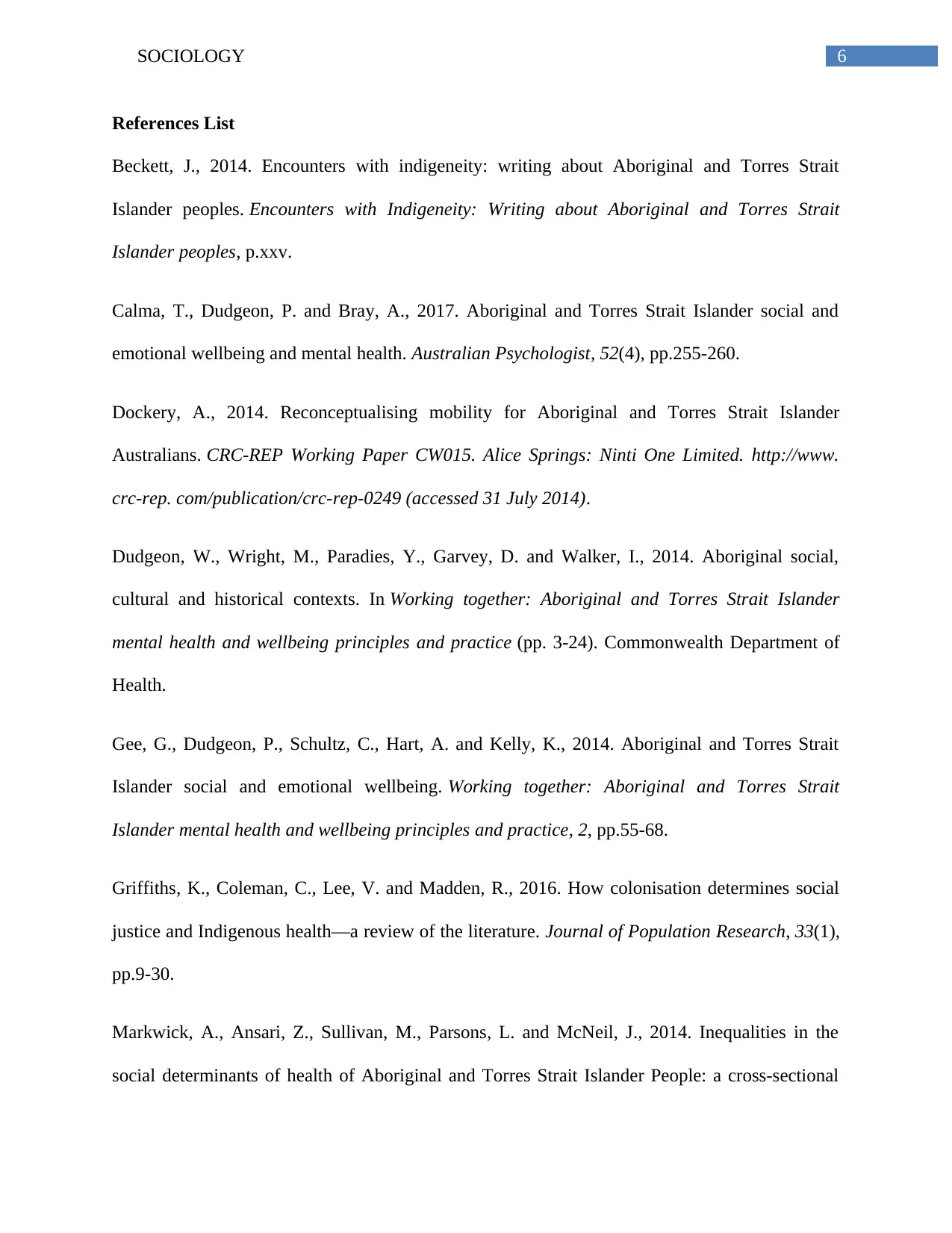
6SOCIOLOGY
References List
Beckett, J., 2014. Encounters with indigeneity: writing about Aboriginal and Torres Strait
Islander peoples. Encounters with Indigeneity: Writing about Aboriginal and Torres Strait
Islander peoples, p.xxv.
Calma, T., Dudgeon, P. and Bray, A., 2017. Aboriginal and Torres Strait Islander social and
emotional wellbeing and mental health. Australian Psychologist, 52(4), pp.255-260.
Dockery, A., 2014. Reconceptualising mobility for Aboriginal and Torres Strait Islander
Australians. CRC-REP Working Paper CW015. Alice Springs: Ninti One Limited. http://www.
crc-rep. com/publication/crc-rep-0249 (accessed 31 July 2014).
Dudgeon, W., Wright, M., Paradies, Y., Garvey, D. and Walker, I., 2014. Aboriginal social,
cultural and historical contexts. In Working together: Aboriginal and Torres Strait Islander
mental health and wellbeing principles and practice (pp. 3-24). Commonwealth Department of
Health.
Gee, G., Dudgeon, P., Schultz, C., Hart, A. and Kelly, K., 2014. Aboriginal and Torres Strait
Islander social and emotional wellbeing. Working together: Aboriginal and Torres Strait
Islander mental health and wellbeing principles and practice, 2, pp.55-68.
Griffiths, K., Coleman, C., Lee, V. and Madden, R., 2016. How colonisation determines social
justice and Indigenous health—a review of the literature. Journal of Population Research, 33(1),
pp.9-30.
Markwick, A., Ansari, Z., Sullivan, M., Parsons, L. and McNeil, J., 2014. Inequalities in the
social determinants of health of Aboriginal and Torres Strait Islander People: a cross-sectional
References List
Beckett, J., 2014. Encounters with indigeneity: writing about Aboriginal and Torres Strait
Islander peoples. Encounters with Indigeneity: Writing about Aboriginal and Torres Strait
Islander peoples, p.xxv.
Calma, T., Dudgeon, P. and Bray, A., 2017. Aboriginal and Torres Strait Islander social and
emotional wellbeing and mental health. Australian Psychologist, 52(4), pp.255-260.
Dockery, A., 2014. Reconceptualising mobility for Aboriginal and Torres Strait Islander
Australians. CRC-REP Working Paper CW015. Alice Springs: Ninti One Limited. http://www.
crc-rep. com/publication/crc-rep-0249 (accessed 31 July 2014).
Dudgeon, W., Wright, M., Paradies, Y., Garvey, D. and Walker, I., 2014. Aboriginal social,
cultural and historical contexts. In Working together: Aboriginal and Torres Strait Islander
mental health and wellbeing principles and practice (pp. 3-24). Commonwealth Department of
Health.
Gee, G., Dudgeon, P., Schultz, C., Hart, A. and Kelly, K., 2014. Aboriginal and Torres Strait
Islander social and emotional wellbeing. Working together: Aboriginal and Torres Strait
Islander mental health and wellbeing principles and practice, 2, pp.55-68.
Griffiths, K., Coleman, C., Lee, V. and Madden, R., 2016. How colonisation determines social
justice and Indigenous health—a review of the literature. Journal of Population Research, 33(1),
pp.9-30.
Markwick, A., Ansari, Z., Sullivan, M., Parsons, L. and McNeil, J., 2014. Inequalities in the
social determinants of health of Aboriginal and Torres Strait Islander People: a cross-sectional
Paraphrase This Document
Need a fresh take? Get an instant paraphrase of this document with our AI Paraphraser
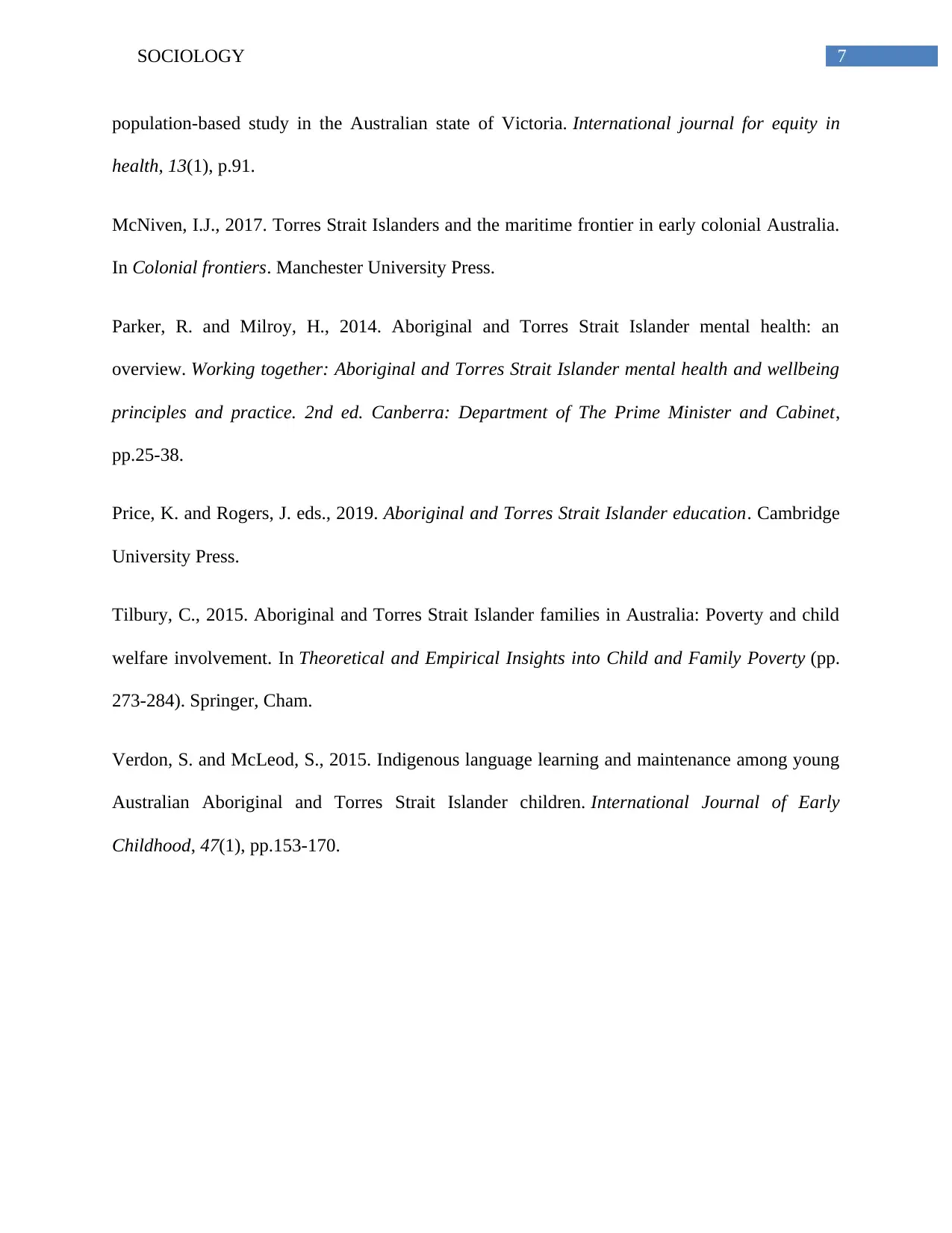
7SOCIOLOGY
population-based study in the Australian state of Victoria. International journal for equity in
health, 13(1), p.91.
McNiven, I.J., 2017. Torres Strait Islanders and the maritime frontier in early colonial Australia.
In Colonial frontiers. Manchester University Press.
Parker, R. and Milroy, H., 2014. Aboriginal and Torres Strait Islander mental health: an
overview. Working together: Aboriginal and Torres Strait Islander mental health and wellbeing
principles and practice. 2nd ed. Canberra: Department of The Prime Minister and Cabinet,
pp.25-38.
Price, K. and Rogers, J. eds., 2019. Aboriginal and Torres Strait Islander education. Cambridge
University Press.
Tilbury, C., 2015. Aboriginal and Torres Strait Islander families in Australia: Poverty and child
welfare involvement. In Theoretical and Empirical Insights into Child and Family Poverty (pp.
273-284). Springer, Cham.
Verdon, S. and McLeod, S., 2015. Indigenous language learning and maintenance among young
Australian Aboriginal and Torres Strait Islander children. International Journal of Early
Childhood, 47(1), pp.153-170.
population-based study in the Australian state of Victoria. International journal for equity in
health, 13(1), p.91.
McNiven, I.J., 2017. Torres Strait Islanders and the maritime frontier in early colonial Australia.
In Colonial frontiers. Manchester University Press.
Parker, R. and Milroy, H., 2014. Aboriginal and Torres Strait Islander mental health: an
overview. Working together: Aboriginal and Torres Strait Islander mental health and wellbeing
principles and practice. 2nd ed. Canberra: Department of The Prime Minister and Cabinet,
pp.25-38.
Price, K. and Rogers, J. eds., 2019. Aboriginal and Torres Strait Islander education. Cambridge
University Press.
Tilbury, C., 2015. Aboriginal and Torres Strait Islander families in Australia: Poverty and child
welfare involvement. In Theoretical and Empirical Insights into Child and Family Poverty (pp.
273-284). Springer, Cham.
Verdon, S. and McLeod, S., 2015. Indigenous language learning and maintenance among young
Australian Aboriginal and Torres Strait Islander children. International Journal of Early
Childhood, 47(1), pp.153-170.
1 out of 8
Related Documents
Your All-in-One AI-Powered Toolkit for Academic Success.
+13062052269
info@desklib.com
Available 24*7 on WhatsApp / Email
![[object Object]](/_next/static/media/star-bottom.7253800d.svg)
Unlock your academic potential
Copyright © 2020–2026 A2Z Services. All Rights Reserved. Developed and managed by ZUCOL.




